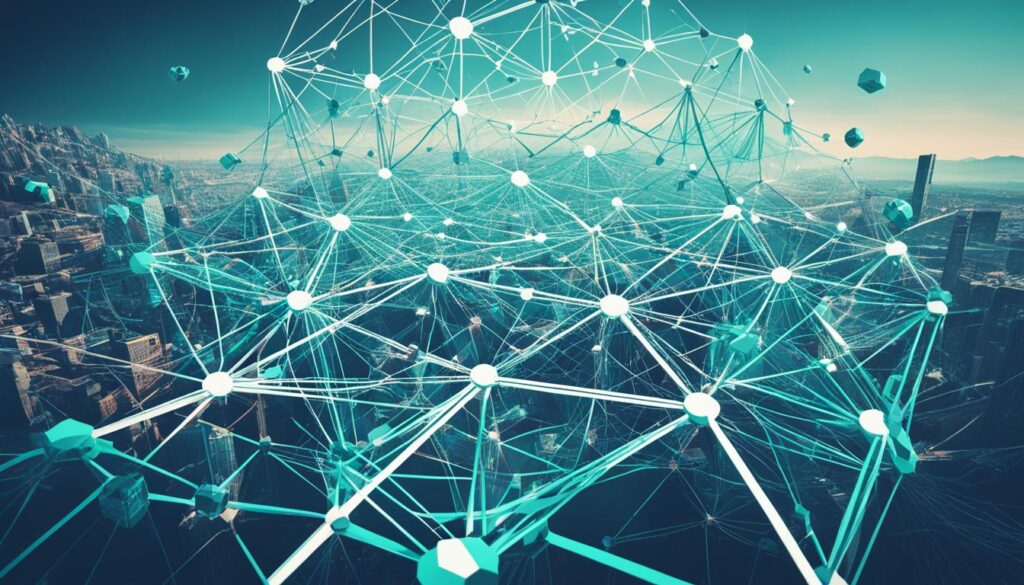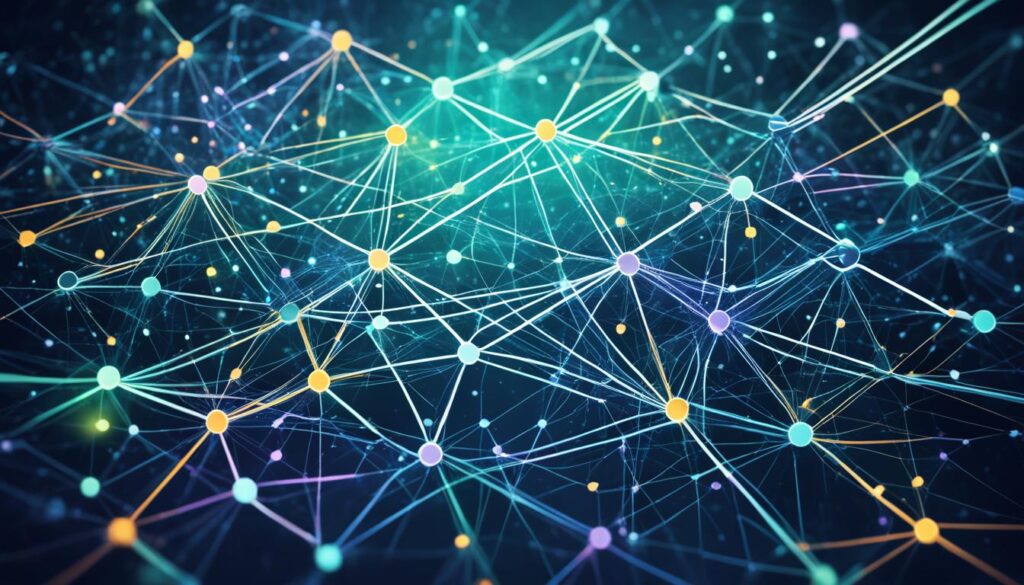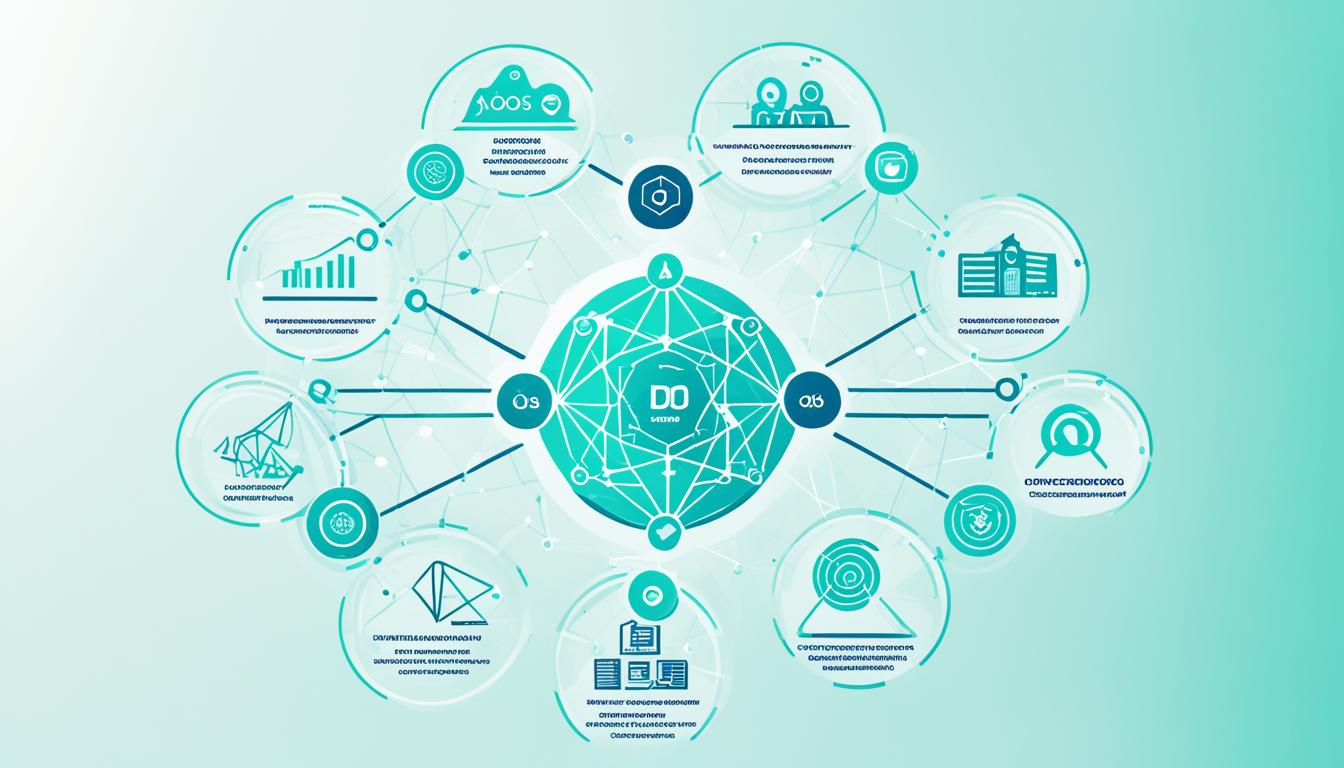Decentralized Autonomous Organizations (DAOs) are revolutionizing the business landscape by driving innovation and disrupting traditional models. DAOs operate without centralized authorities, relying on blockchain technology and smart contracts for decentralized decision-making and governance.
DAOs offer transparent and trustless ways of managing organizations, democratizing the decision-making process, and embracing innovative business practices. Through the use of smart contracts, DAOs automate business processes, maintain secure ledgers, and provide a decentralized structure for members to participate and contribute.
Key Takeaways:
- DAOs operate without centralized authorities, relying on blockchain technology and smart contracts.
- They offer transparent and trustless ways of managing organizations and democratising decision-making.
- Smart contracts automate business processes, maintain secure ledgers, and provide a decentralized structure.
- DAOs drive innovation, disrupt traditional models, and embrace innovative business practices.
- They are at the forefront of reshaping the future of business models with decentralized governance.
Understanding Decentralized Autonomous Organizations (DAOs)
Decentralized Autonomous Organizations (DAOs) are transforming traditional organizational models by operating without a centralized authority. Powered by blockchain technology and smart contracts, DAOs enable transparent decision-making and trustless governance.
DAOs eliminate the need for intermediaries by leveraging blockchain technology and smart contracts to facilitate the allocation of resources and decision-making processes. This decentralized approach ensures transparency, accountability, and autonomy.
Smart contracts, which run on blockchain platforms, automate business processes and maintain secure and immutable ledgers. These contracts define the rules and operations of the DAO, ensuring consistent and reliable execution of tasks.
Members of a DAO hold tokens that represent their stake in the organization, granting them voting rights and other benefits. This token-based governance system allows for collective decision-making, ensuring that the interests of the community are represented.
Key Features of DAOs:
- Decentralized decision-making and governance
- Transparent and trustless processes
- Automation of business processes through smart contracts
- Token-based voting and participation
DAOs rely on proposals and voting to drive decision-making collectively. Members can propose new ideas, initiatives, or changes to the organization. The community votes on these proposals, with voting power often determined by the number of tokens held by each member.
DAOs empower individuals to actively participate in decision-making and shape the direction of the organization. Through transparent voting mechanisms and automated smart contracts, DAOs foster a culture of collaboration and trust among its members.
The use of DAOs extends beyond the realm of traditional businesses. They can be applied to various sectors, including decentralized finance (DeFi), content creation and curation, supply chain and logistics, research and development, as well as charitable organizations and philanthropy.
With their innovative approach to governance and decision-making, DAOs offer a promising future for businesses and communities. They revolutionize how organizations operate, ensuring transparency, inclusivity, and efficiency in a trustless environment.

Practical Applications of DAOs
| Industry | Examples of Practical Applications |
|---|---|
| Decentralized Finance (DeFi) | Lending and borrowing platforms, insurance protocols, liquidity pools |
| Content Creation and Curation | Social networks, NFT marketplaces, publishing platforms |
| Supply Chain and Logistics | Fair distribution, transparent tracking |
| Research and Development | Crowdfunding, scientific collaboration |
| Charitable Organizations and Philanthropy | Efficient fund allocation, transparent governance |
The Structure and Governance of DAOs
Decentralized Autonomous Organizations (DAOs) are composed of various components that shape their structure and governance. At the core of a DAO’s operations are smart contracts, which serve as the building blocks. These smart contracts contain the rules and regulations that govern the organization and define how it operates.
Members of a DAO hold tokens that represent their stake in the organization. These tokens provide them with voting rights and other benefits within the DAO ecosystem. The number of tokens held by a member often determines their voting power, allowing for a more democratic decision-making process.
Proposals and voting play a vital role in the governance of a DAO. Members can submit proposals for various initiatives or changes within the organization, and the entire community can vote on them. This collective decision-making process ensures that all members have a voice and can participate in shaping the direction of the DAO.
DAOs also have treasuries, which serve as a pool of funds to support the organization’s operations and growth. These treasuries can hold various digital assets, such as cryptocurrencies, enabling the DAO to maintain financial stability and fund future projects.
The governance models of DAOs can vary, and different organizations adopt different approaches. Token-based voting is a common method, where voting power is directly proportional to token holdings. Reputation-based voting considers members’ reputation within the community as a factor in decision-making. Quadratic voting is another popular approach that allows members to allocate voting power across different proposals.
Overall, the structure and governance of DAOs revolve around smart contracts, token holdings, proposals and voting, treasuries, and various governance models. This decentralized ecosystem enables transparency, autonomy, and community-driven decision-making, making DAOs a groundbreaking concept in the world of business and governance.
Practical Applications of DAOs
Decentralized Autonomous Organizations (DAOs) are not only revolutionizing the business landscape, but they also have diverse practical applications across various industries. Let’s explore some of the key areas where DAOs are making a significant impact:
Decentralized Finance (DeFi)
In the realm of decentralized finance, DAOs play a crucial role in governing lending and borrowing platforms, insurance protocols, and liquidity pools. By utilizing blockchain technology and smart contracts, DAOs ensure transparent and efficient financial services, removing the need for intermediaries.
Content Creation and Curation
DAOs are transforming the way content is created, monetized, and governed. Content creation and curation DAOs enable collaboration among creators, facilitate fair content monetization, and provide decentralized governance for digital content platforms. Social networks, NFT marketplaces, and publishing platforms are some examples of spaces where DAOs are fostering innovation and transparency.
Supply Chain and Logistics
In the realm of supply chain and logistics, DAOs bring transparency and efficiency to the process. They facilitate collaboration among different stakeholders, ensuring fair distribution, and transparent tracking. Through DAOs, supply chains can become more reliable, secure, and accountable.
Research and Development
DAOs provide a platform for collaboration, crowd-funding, and governance in the field of research and development. Scientific advancements and innovative projects can receive funding and governance through DAOs, enabling collaboration and the sharing of knowledge within the scientific community.
Charitable Organizations and Philanthropy
DAOs offer a new way to streamline donations and governance in charitable organizations and philanthropy. By leveraging transparent and trustless mechanisms, DAOs improve the effectiveness and efficiency of fund allocation, ensuring that resources reach those in need more swiftly and transparently.
The practical applications of DAOs extend beyond these examples, with infinite potential for innovation in various industries. As we embrace the advantages of decentralized governance and blockchain technology, DAOs are set to reshape the future of business operations.

Embracing the Future of Business Operations with DAOs
Decentralized Autonomous Organizations (DAOs) are paving the way for a new era of business models that prioritize transparency, inclusion, and trustless decision-making. With their innovative approaches, DAOs offer a promising future for businesses and entrepreneurs.
One of the key advantages of DAOs is the increased transparency they provide in operations and decision-making processes. Through the use of blockchain technology, DAOs maintain secure and immutable records of all transactions and activities. This transparency builds trust among stakeholders and ensures accountability.
DAOs also promote inclusion by democratizing governance. Rather than relying on a central authority, decisions within DAOs are collectively made by members. Each member has voting rights proportional to their stake in the organization. This inclusive approach gives every member a voice and promotes a diverse range of perspectives.
The trustless nature of DAOs eliminates the need for intermediaries. Smart contracts, which are programmable self-executing agreements, automate business processes and ensure that transactions are executed without the need for intermediaries. This fosters innovation and allows DAOs to adopt disruptive business models that challenge traditional practices.

With their transparency, inclusion, and trustless decision-making, DAOs are reshaping the future of business operations. These innovative business models are driving efficiency, promoting collaboration, and unlocking new opportunities for growth. By embracing DAOs, businesses and entrepreneurs can stay ahead in an increasingly decentralized and digital world.
Joining a DAO provides businesses with access to a global network of talent and resources. Collaboration becomes seamless as participants contribute their expertise and leverage the collective intelligence of the DAO. This collaboration accelerates innovation and aids in problem-solving, enabling businesses to tackle complex challenges effectively.
In conclusion, DAOs offer a transformative vision for the future of business operations. Their transparency, inclusion, and trustless decision-making empower organizations to embrace innovative business models and drive forward in a rapidly evolving landscape. By leveraging the benefits of DAOs, businesses and entrepreneurs can position themselves at the forefront of decentralized innovation and unlock endless possibilities.
Conclusion
DAOs, through their decentralized governance and blockchain technology, are driving innovation and disrupting traditional business models. By providing a new paradigm for decision-making and resource allocation, DAOs empower businesses and entrepreneurs to embrace transparency, inclusivity, and trustless operations. The potential for global collaboration and the practical applications across various industries highlight the transformative impact of DAOs on the business landscape.
Embracing DAOs unlocks untapped potential and propels us into a new era of business models that prioritize transparency, inclusivity, and innovation. With decentralized governance, DAOs shift power away from centralized authorities, enabling a more equitable and democratic approach to decision-making. The use of blockchain technology ensures the security and immutability of transactions, fostering trust among participants and promoting efficiency in operations.
The disruptive nature of DAOs extends beyond their technological foundations. They challenge traditional hierarchies and intermediaries, paving the way for innovative business models that can redefine industries such as decentralized finance, content creation and curation, supply chain and logistics, research and development, and charitable organizations and philanthropy. As businesses and entrepreneurs embrace DAOs, they embrace a future where collaboration, transparency, and decentralized decision-making are the cornerstones of success.
FAQ
What are Decentralized Autonomous Organizations (DAOs)?
DAOs are organizations that operate without a centralized authority, relying on blockchain technology and smart contracts for decentralized decision-making and governance.
How do DAOs function without centralized authorities?
DAOs rely on blockchain technology and smart contracts to automate business processes, maintain secure ledgers, and provide a decentralized structure for members to participate and contribute.
What are the key components of a DAO?
Smart contracts form the foundation of a DAO, while members hold tokens that represent their stake in the organization. Proposals and voting are essential for decision-making, and DAOs often have treasuries that pool funds to support operations and growth.
What industries can benefit from DAOs?
DAOs have diverse practical applications across various industries, including decentralized finance, content creation and curation, supply chain and logistics, research and development, and charitable organizations and philanthropy.
How do DAOs contribute to the future of business operations?
DAOs embrace transparency, inclusion, and trustless decision-making, offering a promising future for businesses and entrepreneurs. They enable organizations to benefit from increased transparency of operations and democratize governance.
What impact do DAOs have on traditional business models?
DAOs are driving innovation and disrupting traditional business models with their decentralized governance and blockchain-enabled solutions. They eliminate the need for intermediaries, fostering innovation and reshaping the business landscape.








